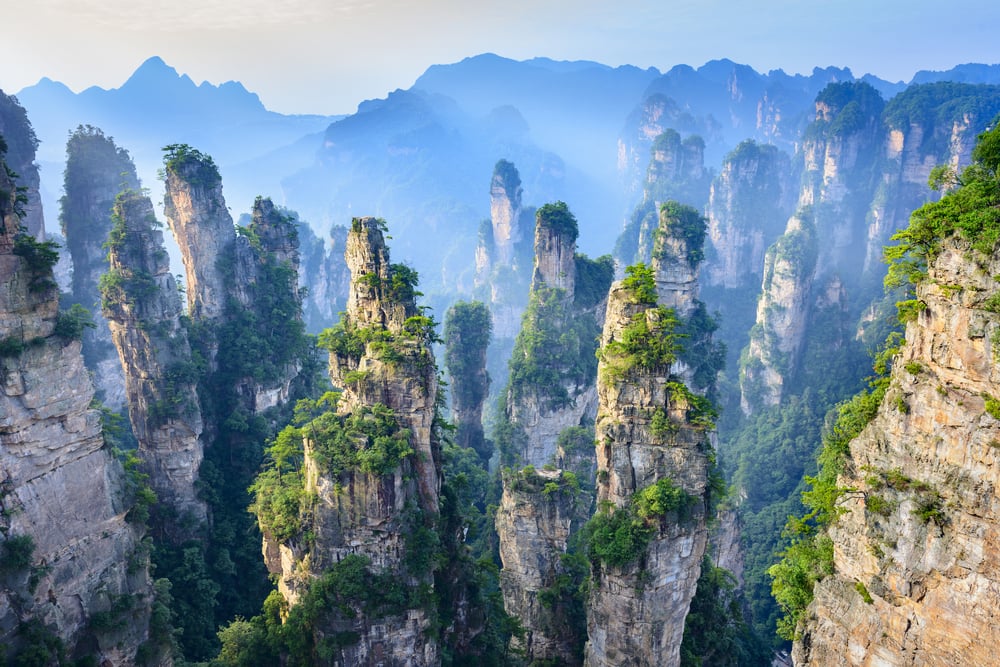
What is Special About Zhangjiajie?
Zhangjiajie, located in the Hunan province of China, is a place of breathtaking natural beauty, unique geological formations, and rich cultural heritage. While the city itself offers modern amenities and vibrant city life, it's the surrounding landscapes that truly set Zhangjiajie apart as a travel destination.
Zhangjiajie National Forest Park: A World of Wonder
Zhangjiajie National Forest Park is probably the most coveted part of the area. The park is comprised of dense forests, deep ravines, deep canyons, unusual peaks, caves, and pillar-like rock formations blanketed throughout the park. These pillar rock formations are what the park is renowned for around the world.
Unique Sandstone Pillars: Nature's Masterpiece
Imagine thousands of towering sandstone pillars rising from the depths of a lush, subtropical forest. These aren't scenes from a fantasy film – this is the reality of Zhangjiajie National Forest Park.
| Feature | Description |
|---|---|
| Formation | Millions of years of erosion by wind, rain, and ice have sculpted these sandstone pillars. |
| Height | Some pillars reach heights of over 1,000 feet (300 meters). |
| Vegetation | The pillars are covered in lush vegetation, creating a surreal and enchanting landscape. |
Inspiration for Avatar's Pandora
The otherworldly beauty of Zhangjiajie National Forest Park was the inspiration for the floating "Hallelujah Mountains" in James Cameron's film Avatar. This cinematic connection has further amplified Zhangjiajie's global fame, drawing travelers eager to experience this fantastical world firsthand.
Beyond the Pillars: Exploring Zhangjiajie's Diversity
- Caves: Explore hidden cave systems adorned with intricate stalactites and stalagmites, such as the Yellow Dragon Cave, one of the largest karst caves in China.
- Hiking Trails: Embark on invigorating hikes along well-maintained trails, offering panoramic views of the park's diverse landscapes.
- Glass Bridges: Challenge your fear of heights on the world-renowned glass bridges, suspended hundreds of meters above the ground, providing unparalleled views of the park's beauty.
Tianmen Mountain: Reaching New Heights
Another must-visit destination within the Zhangjiajie region is Tianmen Mountain, often referred to as the "Soul of Zhangjiajie." This mountain is home to:
- Tianmen Cave ("Heaven's Gate"): A natural arch in the mountainside, accessible by a steep flight of stairs, believed by locals to be a pathway to heaven.
- Cable Car Ride: Experience one of the world's longest passenger cableways, ascending over 7,400 meters, offering stunning views throughout the journey.
- Cliffside Walkways: Test your nerves on the thrilling cliffside walkways built into the vertical cliffs of Tianmen Mountain, providing breathtaking panoramic vistas.
Cultural Experiences: Immersing in Local Traditions
Beyond its natural wonders, Zhangjiajie boasts a rich cultural heritage waiting to be explored:
- Tujia Ethnic Minority: Discover the unique traditions, costumes, and cuisine of the Tujia people, the dominant ethnic group in the region.
- Folklore and Performances: Witness captivating performances of traditional Tujia music, dance, and acrobatics, offering insights into their cultural heritage.
FAQs
What is the best time to visit Zhangjiajie?
Spring (April-May) and autumn (September-October) are considered the best times to visit Zhangjiajie. During these seasons, the weather is pleasantly mild, and the scenery is particularly beautiful with blooming flowers or colorful foliage.
How do I get to Zhangjiajie?
Zhangjiajie is well-connected by air and rail. The Zhangjiajie Hehua International Airport (Wulingyuan Airport) offers domestic and international flights. High-speed trains connect Zhangjiajie to major cities like Changsha, Guangzhou, and Beijing.
Is it necessary to hire a guide in Zhangjiajie?
While not strictly necessary, hiring a guide can enhance your experience in Zhangjiajie, especially if you have limited time or prefer a more structured itinerary. Guides can provide insightful information, navigate the park efficiently, and assist with logistics like transportation and accommodation.